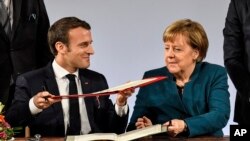The leaders of France and Germany signed a treaty Tuesday renewing their friendship and pledging greater cooperation between their two nations.
German Chancellor Angela Merkel and French President Emmanuel Macron signed the Aachen accord exactly 56 years after their predecessors inked the Elysee Treaty that set the tone for the two countries' relations after centuries of fierce rivalry and bloody conflict.
In the 16-page accord, Berlin and Paris declare it's time to raise their bilateral relations “to a new level and prepare for the challenges that both states and Europe face in the 21st century.”
It comes at a time when the Europe Union, including its two founding members Germany and France, are struggling with rising nationalism that threatens to tear the bloc apart.
Here's a brief guide to the Aachen accord:
Why Aachen?
The location of the signing is heavy with symbolism: Aachen, located on Germany's western borders with Belgium and the Netherlands, was founded by the Romans, making it part of the first pan-European state.
By the Middle Ages it had become the favored residence of Charlemagne, whose Frankish empire spanned much of what is now France, Germany, Italy, Switzerland, Austria and the Benelux nations. A thousand years later, many of those countries would come together again to form the predecessor of the present-day European Union.
The city was also repeatedly occupied by France and is known there by the name Aix-la-Chapelle.
Why another treaty?
The Elysee Treaty of 1963 — signed 18 years after the end of World War II by French President Charles de Gaulle and West German Chancellor Konrad Adenauer — helped forge a partnership that's become the engine of European integration, though one that hasn't always run smoothly.
The new treaty was first announced by Macron in September 2017 in a sweeping speech detailing his ambitions to revive Europe — still grappling with the shock of Britain's referendum to leave the EU, and U.S. President Donald Trump's persistent attacks on America's long-time allies across the Atlantic.
In her weekly address Saturday, Merkel said she and Macron believe that “the world has changed dramatically and we want to draw on what Germany and France have already achieved together.”
Macron's office said the treaty is a “major symbol” aimed at showing the Franco-German motor is still going strong despite the difficult terrain in the EU, with Britain leaving the bloc and nationalism on the rise in several member states.
What's in the treaty?
While parts of the treaty deal with mundane issues along the two countries' 450-kilometer (280-mile) border, Merkel said it's also intended to help tackle global challenges such as climate change and international security.
To this end, France and Germany pledge to increase cooperation in the areas of foreign and defense policy, fighting crime and terrorism, international development and research.
The accord is vague on many of the practical details, but one point that has raised eyebrows elsewhere in Europe is the call for France to support Germany's bid for a permanent seat on the U.N. Security Council.
Merkel's spokesman, Steffen Seibert, rejected the idea that such bilateral arrangements between two countries — home to just 30 percent of the EU's population — could irritate other member states.
“Germany and France also and explicitly want the intensification of their relations in this treaty to service the project of European unification,” he told reporters Monday.
Why are some disappointed?
The careful wording of the treaty reflects different attitudes in Paris and Berlin.
A top French official, who spoke on condition of anonymity in accordance with the French presidency's customary practice, acknowledged that France would prefer to “accelerate” changes in Europe and see the treaty as one more step toward broader reforms.
Merkel, famous for her “step-by-step” approach to politics, is wary of the impact that a perceived surrender of German sovereignty might have on European and state elections later this year.
For decades a bastion of political stability, Germany has seen the rise of a populist, far-right party in recent years that's hostile to the idea of European integration.
Macron, meanwhile, faces discontent at home in the form of the yellow vest protesters — some of whom have circulated misleading claims about the Aachen treaty on social media.
“Germany is being held up as the old enemy again by some,” said Daniela Schwarzer, director of the German Council on Foreign Relations.
She added that one of the big challenges will be selling the Aachen accord to other European countries.
“If you want to move Europe forward, then (Germany and France) need each other more than ever, but at the same time bilateral ties on their own won't be enough.”
Any cheers?
The treaty is likely to have the biggest impact on people living in the border regions of France and Germany, where cross-border public transport and support for bilingual schools will be boosted.
Businesses, too, are welcoming the accord.
Eric Schweitzer, head of the Association of German Chambers of Industry and Commerce, said both countries' economies could benefit.
Germany is France's biggest trading partner. And France is Germany's second biggest export market.
Strengthening the EU, with its common market, is important to German companies at a time of growing protectionist sentiment, said Schweitzer.
He also noted plans to increase cooperation on training and education, which could improve cross-border labor mobility.
About 4,000 German companies employ more than 300,000 people in France, with a turnover of more than 150 billion euros ($170 billion) a year.




